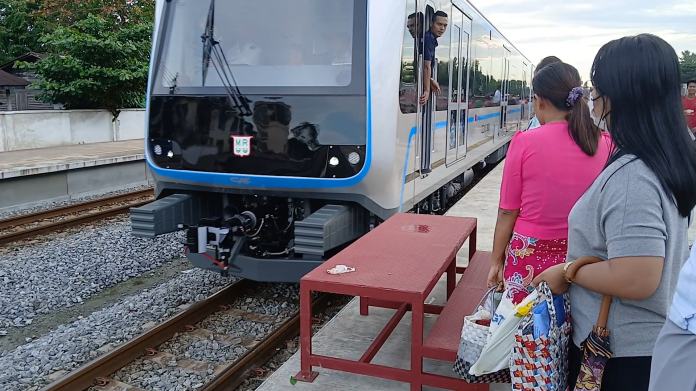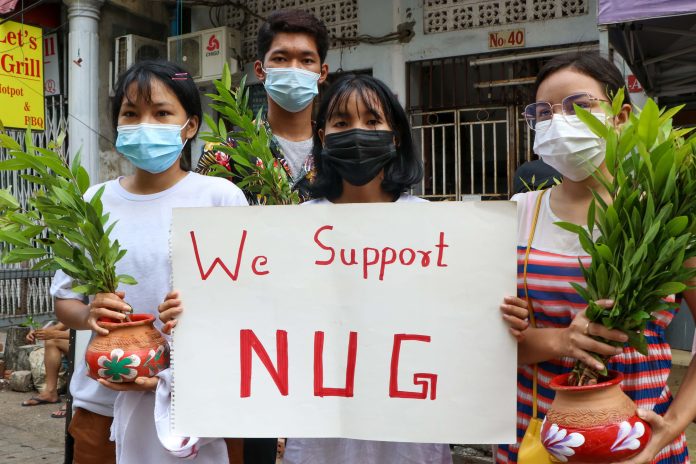Guest contributor
Myo Yan Naung Thein
Following the military coup in February 2021, the elected representatives of the union parliament, known in Burmese as the Pyidaungsu Hluttaw, established the Committee Representing Pyidaungsu Hluttaw (CRPH). In collaboration with various ethnic revolutionary organizations (EROs), the CRPH then formed the National Unity Government (NUG) and subsequently the National Unity Consultative Council (NUCC). This development aimed to represent the interests of the people and coordinate efforts against the military regime, which seized power in Naypyidaw.
The NUCC was established as a political leadership body intended to oversee and direct revolutionary efforts, drawing parallels to the role of the Continental Congress during the American Revolution. The NUCC consists of five distinct constituencies: elected parliamentarians, political parties, Civil Society Organizations (CSOs), EROs, and interim state, federal, and ethnic representative committees. This diverse structure is designed to provide comprehensive representation for various stakeholders in the effort to achieve national unity and democratic governance.
However, at its formation, the NUCC did not achieve full participation from all EROs. The Karen National Union (KNU), the Karenni National Progressive Party (KNPP), and the Chin National Front (CNF), were the only EROs represented. The interim state, federal, and ethnic representative committees, included in the NUCC, also function as representative bodies for ethnic nationalities. These committees encompass the Kachin Political Interim Coordination Team (KPICT), the Interim Chin National Consultative Council (ICNCC), the Mon State Federal Council (MSFC), the Karenni State Consultative Council (KSCC), the Pa-O National Federal Council (PNFC), and the Ta’ang Political Consultative Council (TPCC).
As these interim councils are associated with EROs, it can be observed that a total of eight have participated in the NUCC, either directly or indirectly. However, following the withdrawal of the KPICT in 2022, the current number of participating groups has been reduced to seven. The NUG includes representatives from CSOs, EROs, and interim state, federal, and ethnic representative committees, in addition to representatives from the National League for Democracy (NLD) party. This composition suggests that the NUG is reasonably well-represented.
Despite the presence of these representatives, EROs within the NUCC and NUG remain questionable. A central concern is whether the representative ministers involved in the NUG can represent the EROs, and how do they view the NUG? While the NUCC and NUG feature representatives from various ethnic nationalities, prominent figures from EROs are conspicuously absent. NUG Acting President Duwa Lashi La is linked to the KPICT, which includes the Kachin Independence Organization (KIO) and its armed wing, the Kachin Independence Army (KIA). It remains unclear whether the KIO/KIA recognizes him, and their position on Duwa Lashi La has not been clearly articulated.
The KIA seems to view the NUG not as a representative government for all of Myanmar, including Kachin State, but rather as a governing body focused primarily on mainland Myanmar. This perspective is reflected in their choice of terminology, referring to the NUG as an alliance instead of a comprehensive governing authority for the entire nation. Although this viewpoint has not been officially articulated, the interactions between the groups and remarks from officials suggest a prevailing sentiment. This perspective is not unique to the KIA. It is shared by other groups affiliated with the NUCC and the NUG.
Additionally, the limitation placed on the People’s Defense Forces (PDF), the armed wing of the NUG, to operate exclusively within mainland Myanmar further supports this interpretation. Perceiving the NUG solely as a government representing mainland Myanmar may influence the attitudes of EROs that are not part of these frameworks.
The NUG has recognized that, in practical terms, it primarily functions as the government for mainland Myanmar, with the PDF concentrating its efforts in the region. This understanding has prompted the NUG to form military alliances, such as the K3C and J2C. The international community acknowledges this perspective, which is why discussions regarding Myanmar often involve both the NUG and EROs.
As a result of its initiatives, in January, the NUG was able to publish a political common position in conjunction with the KNU, the KNPP, and the CNF. However, it appears that several EROs were not included in this announcement. The organizations that signed the common position with the NUG are those perceived to be outside of China’s influence, while those that abstained are believed to be under it. Since the beginning of the Spring Revolution in 2021, China has been exerting pressure on EROs within its sphere of influence to refrain from cooperating with the NUG.
Since earlier this year, China’s involvement in Myanmar’s political landscape has become more pronounced. Observers suggest that China is pursuing a transitional model centered around regime leaders. The strategy involves holding elections and transferring power to political parties aligned with the generals, with the aim of addressing the ongoing crisis in Myanmar. However, political parties such as the NLD and the Shan National League for Democracy (SNLD), which have support from the people, have expressed their refusal to participate in elections orchestrated by the regime.
Concerns have been raised that the shift in power from the regime to generals in civilian attire may not lead to meaningful change. As a result, the existing political issues and ongoing conflicts in Myanmar will only continue to develop. Earlier this month, Myanmar Now obtained a detailed transcript of the meeting between Chinese special envoy Deng Xijun and leaders of the United Wa State Army (UWSA), which sheds light on China’s involvement in Myanmar’s affairs and its “divide and rule” strategy among EROs. China appears to support the regime and seeks to marginalize the NUG. While it exerts pressure on EROs, Beijing also seems to align with the regime’s efforts to exclude the NLD by facilitating elections that do not include Myanmar’s ousted governing party, nor its jailed leader State Counsellor Aung San Suu Kyi.
Post-coup Myanmar presents a significant opportunity to address long-standing issues regarding the military, which has been associated with cruelty, oppression, conflict, and poverty for over 60 years. The military is currently facing significant challenges and appears to be weakened. However, if EROs yield to Chinese pressure, there is a risk of losing this chance for change, with uncertainty about whether such an opportunity will arise again in the future. The military could regain political and military strength if not effectively challenged. As long as the military remains in power, Myanmar’s complex issues, including the lack of democratic and federal rights, as well as ongoing poverty and underdevelopment, are unlikely to be resolved. The future of the country hinges on addressing these systemic issues.
To effectively address China’s pressure, it is crucial for the NUG and EROs to consolidate their political and military efforts. This unity could enable a quicker response to the regime and enhance the international community’s confidence in Myanmar’s revolution. This could potentially lead to increased global support and recognition. A cohesive alliance between the NUG and EROs might also impact China’s strategy, as Chinese leaders are known for their pragmatic approach and adaptability to changing circumstances.
It is noteworthy that in 2014, Chinese President Xi Jinping hosted Aung San Suu Kyi, a notable shift given China’s previous support for the previous regimes that had suppressed the NLD party. This change indicated a re-evaluation of China’s stance towards the NLD, reflecting its recognition of Myanmar’s strategic importance and its desire to maintain influence in the region. China seems to intervene when it can assert control, while also acknowledging situations beyond its influence.
The NUG was established by the CRPH, which received a popular mandate from the 2020 election and has been recognized by the NUCC. Thus, it can be regarded as the legitimate government representing all of Myanmar. However, as noted earlier, the NUG currently has authority limited to mainland Myanmar, as its administration is not permitted to operate in areas controlled by EROs. If the EROs and the NUG were to create a unified revolutionary government, the popular legitimacy of the NUG could shift from a theoretical idea to a practical reality, potentially establishing it as a genuine union government of the revolution.
While the NUG and EROs need to continue discussions and negotiations regarding the formation of federal units and a future federal union, it is crucial for them to function as a unified government, collaborating strategically on both political and military fronts. Without a strategic and unified effort, the EROs may find it difficult to manage the current situation independently, which could lead to the continued dominance of the military in Myanmar and the persistence of existing issues facing the country. A cohesive government is essential for navigating the complexities of the current landscape, as fragmentation could enable the military to maintain its influence, thereby exacerbating the challenges confronting Myanmar.
Myo Yan Naung Thein is the visiting researcher and co-chair of the Burmese Democratic Futures Working Group, University of Virginia. He has traveled across the U.S. speaking to students, church groups, policymakers and members of the Myanmar diaspora to build support for democracy and the return to civilian rule.
DVB publishes a diversity of opinions that does not reflect DVB editorial policy. We’d like to hear what you think about this or any of our stories: [email protected]











